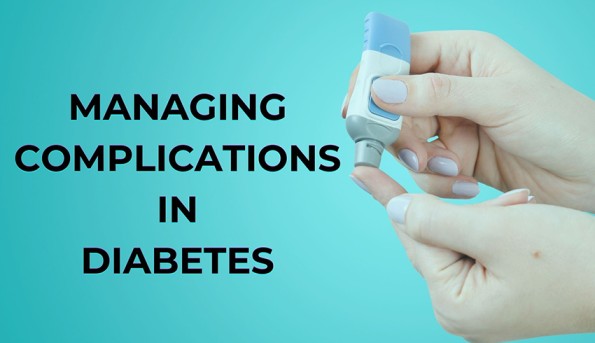Understanding Diabetes
Diabetes is a progressive condition in which the blood sugar levels rise in abnormal proportions. When food is eaten, the carbohydrates are processed and sugar is released into the blood. This leads to a temporary rise in blood sugar levels. The pancreas releases the hormone insulin which processes the sugar in the blood, thereby bringing the blood sugar levels to a normal range. Blood sugar levels vary throughout the day according to the fasting and post-meal states. A person is diagnosed with Diabetes when his or her body fails to process the blood sugar either due to insulin deficiency or due to insulin impairment.
Type 1 Diabetes is an autoimmune condition where the beta cells in the pancreas fail to produce any insulin. This leads to an absolute deficiency of insulin. This condition is also known as juvenile Diabetes as it is commonly observed in children and adolescents. People with Type 1 Diabetes require insulin injections to manage their blood sugar levels.
A person is diagnosed with Type 2 Diabetes if there is little production of insulin in the body or the produced insulin is incapable of processing the sugar in the blood. People with Type 2 Diabetes are often prescribed oral anti-diabetic drugs along with diet, exercise for weight loss and lifestyle modifications to manage their blood sugar levels.
| Fasting Blood sugar | OGTT blood sugar | HbA1c | Blood sugar category |
| <100 mg/dL | <140 mg/dL | Below 5.7 | Normal |
| 100 to 125 mg/dL | 140 to 199 mg/dL | 5.7 to 6.4 | Prediabetes |
| 126 mg/dL or more | 200 mg/dL or more | 6.5 or more | Diabetes |
Complications of Diabetes
Uncontrolled blood sugar levels may hamper the functioning of the body and may affect different organs of the body. High blood sugar levels may affect the blood vessels of the heart and may cause heart attack and stroke. Heart disease is one of the most common causes of death in people with Diabetes. Obesity may lead to high cholesterol levels which may cause a blockage in the vessels of the heart. This may lead to a heart attack. High blood sugar levels and high blood pressure may hamper the filtration capacity of the kidney and may lead to kidney disease.
Uncontrolled blood sugar levels may affect the blood circulation in the nerves especially in the extremities such as the feet. This may reduce sensation in the foot and may lead to diabetic neuropathy. This causes loss of sensation of any wound or ulceration in the foot. Severe complications of the foot may sometimes lead to amputation.
Research studies have found that people with uncontrolled Diabetes may develop eye problems within 5 years of Diabetes diagnosis. High blood sugar levels and high blood pressure may cause damage to the nerves in the eyes and may lead to diabetic retinopathy. If not diagnosed in time, it may lead to partial to total blindness.

Managing Diabetes
Management of blood sugar levels is important in people with Diabetes to prevent complications. Research studies have shown that more than Diabetes itself, the complications caused by uncontrolled blood sugar levels are a major reason for hospitalisation. To keep blood sugar levels under control, it is important to manage:
- Diet – High carbohydrate and high-calorie food may increase body weight and blood sugar levels. People with Diabetes are recommended to consult their dietician to manage their calorie intake and split their meals evenly to prevent post-meal blood sugar spikes. It is also recommended to take protein and healthy fats and avoid deep-fried foods.
- Exercise – Research studies have shown that moderate to high-intensity exercise at least 30 minutes five days a week may improve metabolism and reduce body fat. Exercising promotes mobility of the joints and may also help improve insulin sensitivity. This improves better absorption of sugar in the blood and prevents ageing-related pain and injuries.
- Glucose monitoring – It is necessary to regularly check the fasting and OGTT blood sugar levels in a clinical setting to understand the impact of diet, exercise and medication on a person with Diabetes. HbA1c provides the three month average of the blood sugar. Continuous glucose monitoring helps to understand the blood sugar patterns of a person throughout the day and helps correct any blood sugar spikes or lows (or hypoglycaemia).
- Medication – Oral anti-diabetic drugs are prescribed keeping in view factors such as blood sugar levels and blood sugar patterns of a person. These medications help to manage blood sugar levels and help prevent complications that may arise due to uncontrolled Diabetes.
- Insulin – People with Type 1 Diabetes require insulin to manage their blood sugar levels as there is an absolute deficiency of insulin. People with Type 2 Diabetes may be prescribed insulin along with oral medication to control their blood sugar levels. Insulin is categorised based on its duration and time of action. Insulin dosage and frequency are decided according to blood sugar spikes. Research studies have observed that early administration of insulin prevents heart disease and eye complications.
- Annual testing – Annual checking of lipid levels and urine test help to assess the proper functioning of the heart and the kidney. This may help in the early diagnosis of complications, guide treatment and prevent heart attack, stroke and kidney disease. Check-up of the eyes and feet can help look for any changes in the blood flow in the nerves.
Counselling
Counselling plays a crucial role along with diet, exercise and medication in managing Diabetes. People should be educated about the importance of medications in managing their condition. People should be educated to manage their diet and to count their calorie intake. They should be educated to split their calorie intake into small meals at different times of the day. People should also be educated about the


